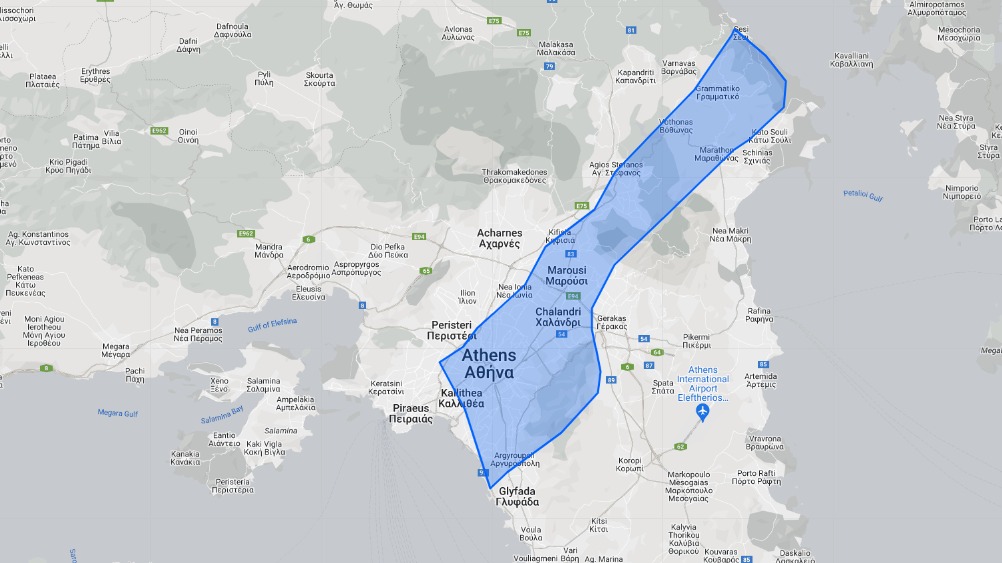In this 365 km2 region (In the foreground, the city of Athens stands, providing a clearer perspective on the scale of Gaza), Israel has unleashed a barrage of thousands of bombs within the span of two weeks. This number is more than the international anti-ISIS coalition used (2,500 bombs per month) across 46,000 km2 in Syria and Iraq. The outcome is the brutal killing of more than 5,000 Palestinian and the displacement of over 1 million people.
Gaza, home to just over 2 million inhabitants, currently grapples with severe shortages of essential resources such as water, food, medicine, and electricity. The dire situation has left the people of this region in a state of desperation. The situation is further compounded by the presence of approximately 300,000 Israeli soldiers positioned on the border, prepared for a potential invasion into the region.
Palestinians have lived for decades with Israelis normalizing violence against them. For secular Zionists, they are seen as a threat to the Jewish State, while for religious Zionists, Palestinians should not even exist. The crisis of the Zionist state in the past months was the logical result of the continuity of the Nakba and the continuity of Palestinian resistance. The increased support for the religious right is partly because Labor Zionism, which formed every government from 1948 until 1977, couldn’t quell the Palestinian resistance.
As the Israeli religious right-wing continues its attacks, with the government backing increasing settler rights and violence, Palestinians had forced into a fiercer fightback. Palestinian has witnessed several moments of collective uprising, from 2015 to the present. These moments of revolt have been fleeting, ebbing and flowing with the tide of colonial provocation. But they have also steadily increased, and have generally tended to become broader and more inclusive with every time, extending to include progressively broader geographical areas and wider sections of Palestinian society. The “Unity Intifada” of May 2021 was a major step forward in asserting Palestinian identity and rights which brought Palestinian citizens of Israel back into the fold of direct confrontation with Israeli authorities.
Palestinian resistance has also galvanized unprecedented levels of international solidarity, whether in the battle over international public opinion, academia, the escalation of the BDS movement, or even through worldwide events
However, under the right-wing Israeli governments, Palestinians faced accelerated life threats. Israeli colonization includes a process that could be called de-democratization, a deliberate project of dividing and weakening Palestinians by dismantling their political structures. Hamas’s attack on civilians transformed this de-democratization and threat to a higher level and helped legitimize the killing of Palestinians.
Let’s think about this; western aid money has flowed into the Palestinian Authority, allowing for the creation of new ministries and the expansion of its powers. However, instead of a broad national liberation movement, Palestinians are left with a quasi-sovereign security state completely dependent on Israel, Western and mostly Arab states for its economic and political survival.
On the other side, what claims to be “resistance” that attacked the civilians, is a right-wing reactionary trend, an enemy of progressivism, anti-left, and anti-worker, which does not even allow the formation of workers’ unions and free activity for other political and social tendencies.
What has occurred here defines a political-Islam movement as a form of resistance and diminishes the prospects for the formation and growth of popular secular or leftist organizations among the Palestinian population. This situation also aids in the resurgence of extreme right-wing tendencies in Israel. Over the past few months, these tendencies have posed a significant challenge to the Likud party and Netanyahu’s political strategy. But it is important to note that this movement has yet to fully address the issues of apartheid and the violation of Palestinian rights.
In a situation where the Palestinian liberation movement faces the most severe attacks from Zionism, the international situation has the potential to evolve into a comprehensive anti-war movement and could also contribute to strengthening the discourse against the occupation of Palestine. The crucial point here is that the global left, particularly in Europe, must recognize the significance of distinguishing between national-religious and sectarian tendencies in the Middle East and the progressive and secular ones in order to understand which political trend they should give support.








